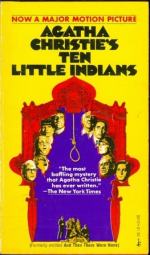|
|
And Then There Were None Epilogue
Sir Thomas Legge and Inspector Maine are discussing the mysterious case of Indian Island. No one in the town of Sticklehaven knows anything, other than the fact that a Mr. Owen bought the house. The house was actually purchased by Mr. Morris, who was a small-time criminal involved in the drug trade. They can't get any answers from him, though, because he's dead. Some Boy Scouts saw the signaling from the Island, and told Fred Narracott about it. Fred and some other men went out to the Island the next day, and found all ten dead bodies. No one could have left the Island before then, either, since the waves were so bad. The gramophone record offered no clues, as it turns out that it was recorded by an acting company, who were told that it was for an unproduced play. They discuss the accusations made on the record. Maine has investigated all the people on the Island. He found that the Rogers' definitely didn't murder their employer, but according to the old woman's doctor, there were suspicious circumstances around her death. Wargrave definitely wasn't guilty of anything, evidence was discovered later that proved Seton's guilt. Maine doesn't think Vera was guilty, because he believes the coroner's inquest. Armstrong did kill a woman on the table, but Maine considers it an accident, not murder. There wasn't anything criminal in Emily's behaviour either. Legge notes that Owen seemed to be going after criminals that no court could punish. Lombard and Macarthur are all the same - there's a suggestion of guilt, but no proof. Marston was let off with a slapped wrist. Legge believes that Blore was guilty, though. At the time, he'd thought Blore was a criminal, but he'd never been able to prove anything.
Legge notes that it's a little convenient that Morris is dead - of a sleeping pill overdose the night everyone went to the Island. There's no evidence that it was anything other than an accident, though. Maine says that if no one could have left the Island, then the killer must have been one of the people on the Island - but that's impossible. Vera and Emily kept diaries, allowing the police to reconstruct the order in which the murders took place. Which means that if the killer was one of them, it had to be Lombard, Blore or Vera. It couldn't be Armstrong because his body had been dragged out of the sea. Lombard couldn't have been the killer - if he'd killed everyone and then shot himself, how could the revolver have been found in Wargrave's room, with only Vera's prints on it? Vera couldn't be the killer either - if she'd been the last to die, then the chair she used to hang herself would have been kicked away. The chair was placed neatly against the wall. Which means the only suspect left is Blore, but neither Legge nor Maine can believe that Blore would have killed himself, let alone killed himself by dropping a giant block on his head. So they have no suspects, and no way to figure out who the murderer was.




